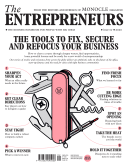
The Entrepreneurs
Monocle’s handsome special-edition magazine that’s brimming with big insights, global analysis and case studies to use to keep your company hale and healthy. We chart the choppy waters from first steps to successful scaling-up and bring inspiration, ideas and tips on everything from starting up to starting over.
In This Issue
Oops! No content was found.
Looks like we no longer have content for the page you're on. Perhaps try a search?
Return Home

